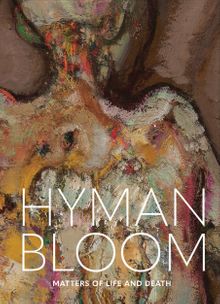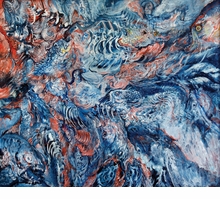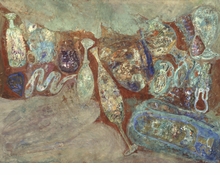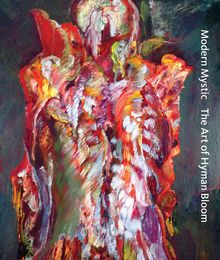ARTIST MONOGRAPHS
|
|
STATUS: Out of stock Temporarily out of stock pending additional inventory. |
 Hyman Bloom: Matters of Life and Death
Hyman Bloom: Matters of Life and Death
Published by MFA Publications, Museum of Fine Arts, Boston.
Text by Erica E. Hirshler, Naomi Slipp.
"Bloom's unsettling paintings are fueled by a sense of existence as a state of spiritual emergency and of art as a means for transfiguring fear." –Holland Cotter, Art in America
Hyman Bloom was a contemporary of Willem de Kooning, Jackson Pollock and Arshile Gorky. This new study focuses on Bloom's paintings and drawings of human corpses, anatomical studies and archeological excavations from the 1940s and 1950s. He often returned to these subjects throughout his career, using thickly applied paint in rich colors as he aspired to present both the physical and the spiritual on canvas.
Insightful curatorial essays accompanied by beautiful full-color reproductions explore this difficult but compelling work, considering themes such as the life, death and rebirth of Bloom's artistic reputation; the growing divide between figuration and abstraction at this defining moment of American art; earlier artistic traditions of representing mortality; the relationship between these works and Bloom's Judaism, interest in Eastern religions, and belief in reincarnation; and the artist's desire to find beauty and meaning within death and decay. In these drawings and paintings, as Bloom himself asserted, "the paradox of the harrowing and the beautiful [can] be brought into unity."
Hyman Bloom (1913–2009) was born in Lithuania, now Latvia. He and his family immigrated to the United States in 1920, escaping anti-Semitic persecution. He lived and worked in the Boston area until his death. His work is held in many public collections, including the Museum of Modern Art, the Museum of Fine Arts, Boston, the Whitney Museum of American Art and others.
PUBLISHER
MFA Publications, Museum of Fine Arts, Boston
BOOK FORMAT
Hardcover, 8.25 x 11.5 in. / 112 pgs / 66 color.
PUBLISHING STATUS
Pub Date 7/23/2019
Active
DISTRIBUTION
D.A.P. Exclusive
Catalog: FALL 2019 p. 133
PRODUCT DETAILS
ISBN 9780878468614 TRADE
List Price: $40.00 CAD $55.00 GBP £30.00
AVAILABILITY
Out of stock
STATUS: Out of stock Temporarily out of stock pending additional inventory. |



